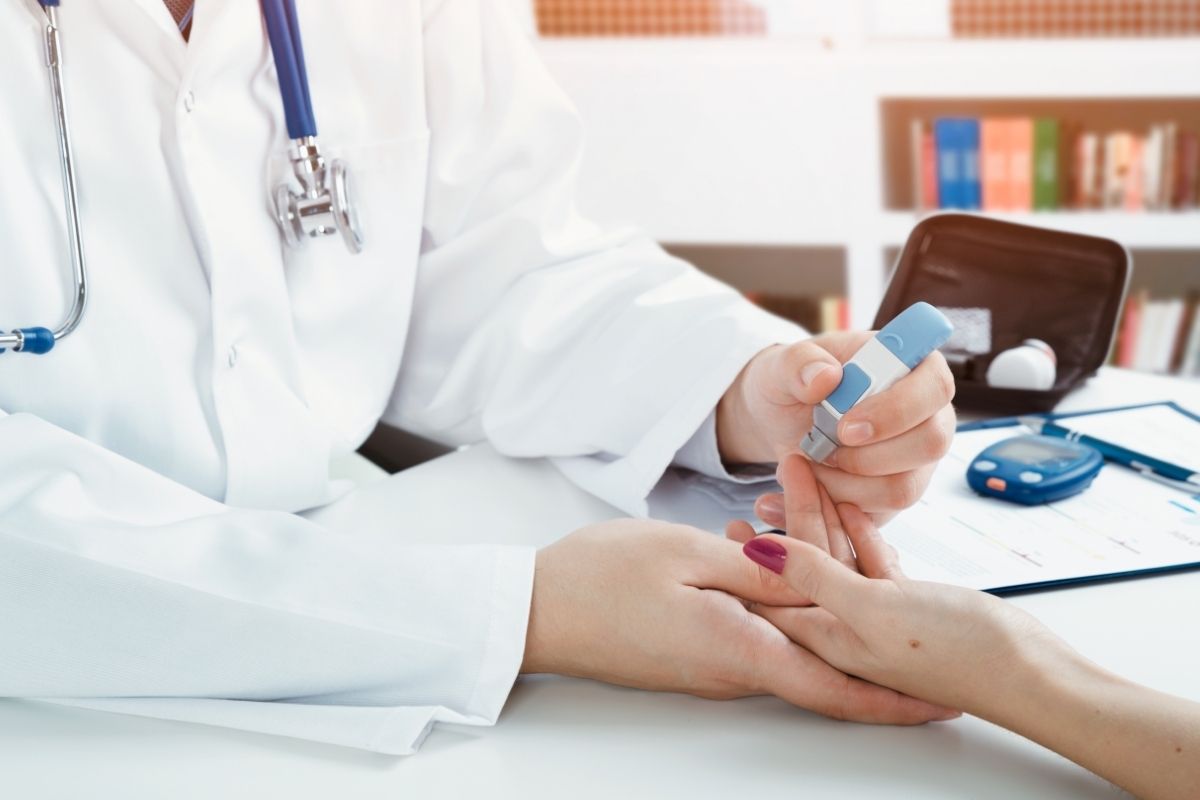A glass of wine now and then isn’t an issue for most, but people with health concerns should step away from the bottle.
Blood sugar plays a major part in your overall health, and alcohol can have a huge impact on your blood sugar levels.

The term blood sugar refers to how much sugar is in your blood at any one time.
Alcohol can both increase and decrease your blood sugar, which is very dangerous for diabetics.
Even if you don’t have diabetes, alcohol can increase the chance of you developing diabetes later, as the extra calories and blood sugar will affect your insulin levels.
We’ll cover more about how alcohol affects blood sugar in this article, including whether quitting alcohol lowers blood sugar or not.
Blood Sugar Basics
Also known as blood glucose, blood sugar travels from the cells into the bloodstream.
The term blood sugar refers to the concentration of sugar within the blood at a particular period.
Sugar comes from the foods that we eat, so the body needs to manage our blood sugar levels, ensuring they don’t increase or decrease too much.
Homeostasis is the process by which the body maintains its internal environment, which involves balancing the body’s blood sugar levels.
Blood sugar levels will naturally rise and decline during the day.
This will depend on when you eat and how the body releases insulin, a hormone that regulates the amount of sugar in the blood.
If a person has just eaten, their blood sugar levels will rise temporarily, then decrease again.
However, those with diabetes will have to look after their blood sugar levels more closely, as it can be difficult for their bodies to regulate their levels.
If a person’s blood sugar is always high, they will have hyperglycemia. This can occur in diabetics who don’t manage their condition effectively.
If someone’s blood sugar is too low, this is known as hypoglycemia. This can also occur in diabetics who take too much medication.
Now you know more about blood sugar, we can cover how alcohol affects blood sugar levels.
How Does Alcohol Affect Blood Sugar Levels?
To understand how alcohol affects blood sugar, you should understand how important the liver is when it comes to regulating blood sugar levels.
When a person drinks, alcohol affects the liver and its ability to deliver glucose into the bloodstream, as required.
Alcohol can damage the liver and prevent it from releasing glycogen, which prevents the blood sugar from decreasing too much.
Diabetics that drink alcohol with their insulin medication may encounter hypoglycemia.
Alcohol can make blood sugar rise and decline again to dangerous levels.
This happens as alcohol already contains a lot of sugar, which causes the first spike.
The body will release insulin to attempt to decrease these high sugar levels, then stop the liver from releasing more sugar.
As this happens, the blood sugar will start to rise, and will then decline again.
This is very dangerous for those using insulin as it can cause hypoglycemia.
Furthermore, many diabetic medicines aren’t meant to be taken alongside alcohol.
People with diabetes who are worried about how alcohol affects their blood glucose should check their levels while they drink.
Do so before and after drinking alcohol, and before you go to sleep, as this can help avoid experiencing hypoglycemia while you sleep.
Always take care when taking medication to lower high blood sugar after drinking alcohol, as these levels can decrease rapidly, leading to hypoglycemia.
Alcohol And Blood Sugar Recommendations
The ADA (American Diabetes Association) advises certain guidelines regarding alcohol and blood sugar.
In the case of blood sugar, they recommend that women shouldn’t consume more than one drink per day, while men shouldn’t exceed two.
Diabetic patients should never drink alcohol if their blood sugar is low or if they haven’t eaten.
They should also avoid using the calories in alcohol as a meal choice in their diet plan. Some types of alcoholic drinks may be worse than others.
For instance, diabetic patients are often advised to avoid heavy craft beers, as they contain higher amounts of carbohydrates.
Every alcoholic drink will have differing amounts of carbohydrates and sugars, so always read the label before drinking a beverage.
Sticking to serving sizes is another way to stay on the safe side.
What If You Don’t Have Diabetes?

We now know how alcohol affects blood sugar, but what if you don’t live with diabetes?
Unfortunately, alcohol can still affect your blood sugar. Alcohol contains a lot of sugar and calories.
These empty drinks can increase your chance of getting type 2 diabetes.
Drinking in moderation isn’t likely to cause type 2 diabetes, but excessive drinking is easily done.
Just a glass, bottle, or pint more than the recommended daily amount is all that’s needed to trigger diabetes.
If you consume alcohol, make sure you consider how the extra calories and sugars are affecting your overall diet plan.
You might not have diabetes, but drinking excessively can still lead to lower blood sugar.
Drinking will always trigger an insulin response, though it isn’t very likely that these levels will decline to dangerous levels.
How Long Does Alcohol Affect Blood Levels?
Alcohol will keep affecting your blood glucose levels for the duration it’s in your body.
These effects on blood sugar will start to rise as the sugar enters the blood, reaching a peak after the maximum amount of sugar within the alcohol has been absorbed.
This process takes roughly 1-2 hours.
After your body has absorbed all of the sugar that it can from the alcohol, it will start to use the sugar, which lowers the blood sugar levels.
The liver will stop releasing more sugar, which will lower the blood sugar levels again.
This keeps your blood sugar low, for as long as the alcohol keeps affecting your liver.
Once the alcohol has left your system, the liver will start to release sugar again.
This can take around 12 hours, but the exact time will differ from person to person.
Will Quitting Alcohol Lower Blood Sugar?
Quitting alcohol can balance your blood sugar and reduce spikes in their levels.
The body often prevents these blood sugar spikes by converting the sugar into fat. This is often referred to as ‘beer belly’.
Quitting alcohol isn’t easy, but it can lower your obesity risk, which will drastically improve your blood glucose levels.
How Are Alcohol And Diabetes Linked?
People differ on whether light to medium alcohol use will increase the chance of developing diabetes.
Despite this, we do know that alcohol will always increase the risk of type 2 diabetes. Alcohol does this in many ways, such as:
- Injuring the pancreas, an organ that secretes insulin
- Increasing obesity risk
- Lowering the body’s insulin sensitivity
- Damaging the liver, an organ that manages blood sugar levels
The best way for diabetics to avoid alcohol-related issues is to quit drinking alcohol completely.
However, this isn’t always possible, so at a minimum, stick to the ADA’s recommendation of no more than two drinks per day for men, and a single drink a day for women.
The Bottom Line
Alcohol can affect blood sugar levels, even if you don’t have diabetes.
Alcohol prevents the liver from releasing glucose and increases blood sugar so the body processes it quickly.
This can make blood sugar levels drop after the blood sugar spike, leading to hypoglycemia.
Most people, even diabetics, can enjoy an occasional drink but remember that alcohol can take over an hour to process in the liver.
The more you drink, the greater risk of your blood sugar declining to low levels.
If you do have blood sugar issues, always take care, and check your blood sugar before and after you drink.
Sticking to daily recommended guidelines can help you stay safe, though the best way to avoid health issues is to quit drinking completely.
- Overcoming Emotional Intimacy Challenges With Alcohol Misuse - November 18, 2023
- Overcoming Alcohol's Impact on Emotional Intimacy: 13 Essential Tips - November 18, 2023
- 6 Ways to Overcome Emotional Intimacy Challenges With Alcohol - November 18, 2023








